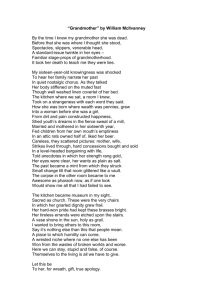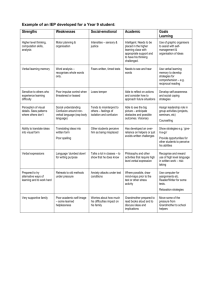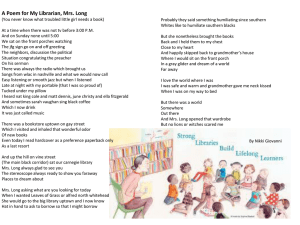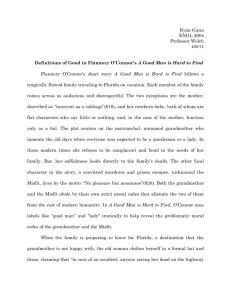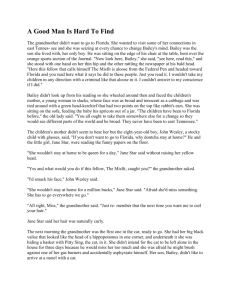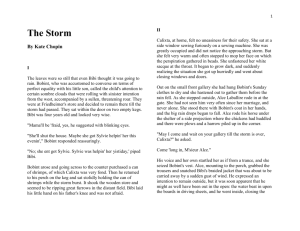The Portrait of a Lady Q&A
advertisement
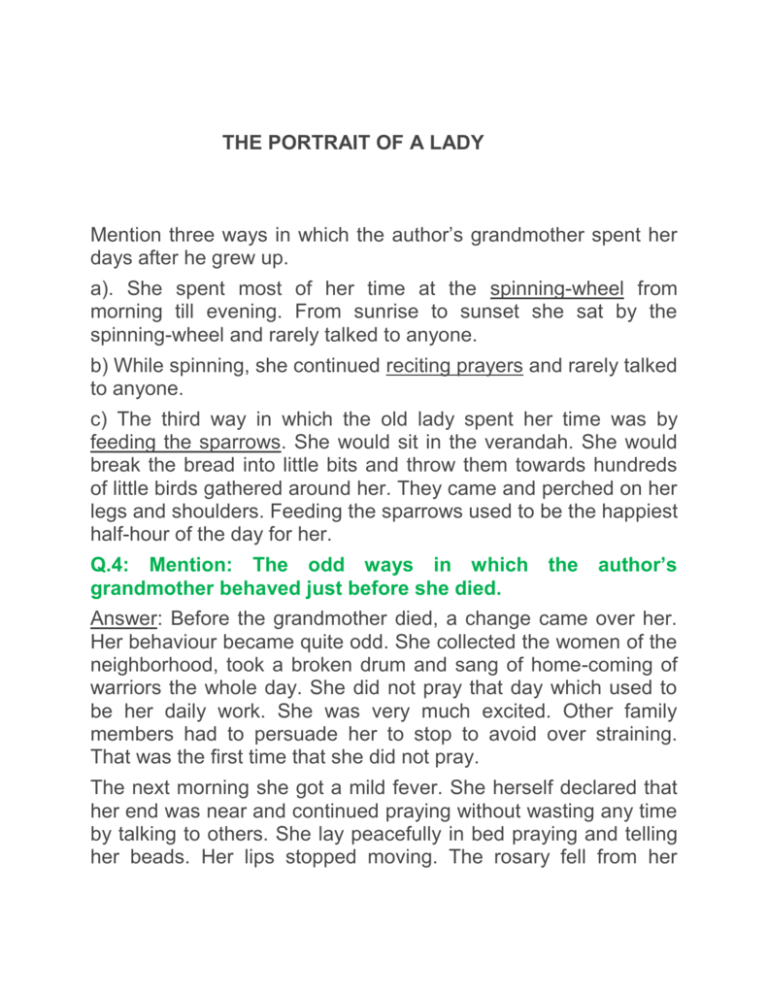
THE PORTRAIT OF A LADY Mention three ways in which the author’s grandmother spent her days after he grew up. a). She spent most of her time at the spinning-wheel from morning till evening. From sunrise to sunset she sat by the spinning-wheel and rarely talked to anyone. b) While spinning, she continued reciting prayers and rarely talked to anyone. c) The third way in which the old lady spent her time was by feeding the sparrows. She would sit in the verandah. She would break the bread into little bits and throw them towards hundreds of little birds gathered around her. They came and perched on her legs and shoulders. Feeding the sparrows used to be the happiest half-hour of the day for her. Q.4: Mention: The odd ways in which the author’s grandmother behaved just before she died. Answer: Before the grandmother died, a change came over her. Her behaviour became quite odd. She collected the women of the neighborhood, took a broken drum and sang of home-coming of warriors the whole day. She did not pray that day which used to be her daily work. She was very much excited. Other family members had to persuade her to stop to avoid over straining. That was the first time that she did not pray. The next morning she got a mild fever. She herself declared that her end was near and continued praying without wasting any time by talking to others. She lay peacefully in bed praying and telling her beads. Her lips stopped moving. The rosary fell from her lifeless fingers. Her face turned pale. Everyone understood that she was no more. Q.5: Mention: The ways in which the sparrows expressed their sorrow when the author’s grandmother died. Answer: Feeding the sparrows was the happiest hour of the day for grandmother. The sparrows and the old lady developed an intimate relationship in this manner. When the grandmother died thousands of sparrows expressed their sorrow by sitting scattered in the verandah in mourning while grandmother’s dead-body lay there. They did not chirrup. Author’s mother threw some pieces of bread but they did not eat them. When they carried grandmother’s corpse they flew away quietly. Thus, the sparrows mourned her death and paid their silent tribute to the grand old lady in a very unique manner. Talking about the Text Q.1: The author’s grandmother was a religious person. What are the different ways in which we come to know this? Answer: The author’s grandmother was a highly religious lady. Her one hand was always busy in telling the beads of her rosary. Her lips constantly moved in an inaudible prayer. She used to get up early in the morning. She did her morning prayer in “a monotonous sing-song”. In village, she accompanied the author to the school and instead of returning home, she used to sit in a temple reading scriptures which was attached to the school. It was because of her religious nature that she could not like the new English school in the city. She was unhappy because there was no teaching about God and scriptures at the city-school. Being a religious lady and a widow, she could be seen hobbling about the house in a spotless white dress. When she realized that her end was near, she stopped talking. She lay peacefully in bed praying and telling her beads till she took her last breathes. Q.2: Describe the changing relationship between the author and his grandmother. Did their feeling for each other change? Answer: The changing circumstances did have a bearing on the relationship between the author and his grandmother. Author and his grandmother lived as intimate friends in the village. A turning point came in their relationship when they came to the city to live with author’s parents. The author joined an English school in the city. She remained confined to home as here she could not accompany him to the school. In the new English school she could not help him in studies. She could not like the kind of education being given to the author at the English school. The grandmother became disturbed as there was no teaching about God and scriptures in the new school. She reconciled herself with spinning and taking to feed the sparrows. When the narrator grew up, he went up to university and then went abroad. The common link of friendship between the author and his grandmother was snapped. His grandmother accepted her seclusion with resignation. No, their feelings for each other did not change though distances grew between them. Q.3: Would you agree that the author’s grandmother was a person strong in character? If yes, give instances that show this. Answer: Yes, it is a fact that the grandmother was a very strong personality. She was a highly religious lady. She was a conservative lady who hated modern views and ways. She had very strong personal likings and dislikes. Being a religious lady and a widow, she could be seen hobbling about the house in a spotless white dress. She used to get up early in the morning. She said her prayers in a monotonous sing-song. One of her hands was always telling the beads of her rosary. According to the author, she was a symbol of white serenity. She had peace and contentment. She had certain rigid ideas about life. She liked the village school because it was attached to the temple. She sat in the temple reading the scriptures. She hated the English school in the city for various reasons. She was unhappy that there was no teaching about God and the scriptures there. She was quite disturbed. They gave music lessons at the school. She considered it fit only for harlots and beggars and not meant for “gentle folks”. When the author returned from abroad after five years, he found her in the same condition. Before she died, she herself declared that her end was near. There were some unique changes in her behaviour. She lay peacefully in bed praying and telling her beads. It is quite difficult to show complete agreement with her outdated views. But she was a strong and determined character. She led her own kind of life and never compromised with her principals. She loved the narrator deeply but never tried to be sentimental or emotional. She had a lasting relationship with her grandson.

